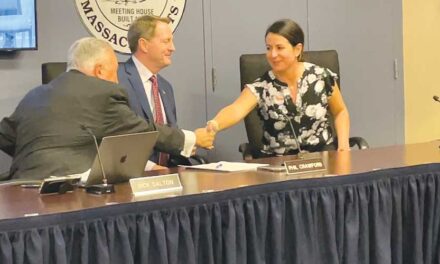Published in the December 21, 2016 edition
By MAUREEN DOHERTY
LYNNFIELD — The Board of Selectmen has adopted a liquor policy applicable to the holders of alcoholic beverages licenses in town.
Additionally three Liquor Enforcement Officers were also appointed by the board: Police Chief Dave Breen, Sgt. Nick Secatore and officer Christopher DeCarlo. The chief said Secatore is also a detective and DeCarlo is a part-time detective as well as an attorney.
Breen explained that liquor enforcement officers (LEO) have the authority to request the holder of a liquor license provide video to them when an investigation into an incident is being conducted. Officers who are not granted LEO status would need to provide a warrant to obtain the same type of information, he said.
Both actions were taken at the board’s Dec. 12 meeting and was unanimous after some discussion.
Breen said they drafted the liquor license policy after attending a recent training session with the Alcoholic Beverages Control Commission (ABCC) with other officers and Town Administrator Jim Boudreau.
“We learned we have an area that we need some language so that we can enforce the current Alcoholic Beverage Control Commission’s rules and regulations. We really don’t have any language here,” Breen told the board.
“We looked at different language that other towns had and we crafted it in a way that we felt made the best sense for the town,” Breen added. He said the portion of the policy that spells out the “punitive action that specifically addressed what the town could do in certain circumstances when there was a violation of the laws” was adopted from an existing policy in Norwell because he and Boudreau believed was “concrete.”
“I’m here to request that it be passed as written,” Breen said.
Selectmen Chairman Phil Crawford said town counsel Tom Mullen made some “adjustments” to the proposed policy and the revised version was received by the board members on the afternoon of the meeting.
“Am I correct in assuming that most of this is prescribed by the ABCC and falls under the state law” which is amended with “the penalties each town may want to propose?” Crawford asked.
Breen said, “Yes. We’ve really needed some language that gives us the ability to enforce the law. Currently we are very vague in that area.”
Breen also promised to hold a meeting at the Al Merritt Center at MarketStreet with all license holders in town once the policy was passed. He said the forum would be used to “inform them what we expect. We’ll give them a copy of the language, explain to them exactly what punitive actions could potentially be (for a) violation.”
“There will be no obscure areas. Everything will be written down in black and white so everyone knows what is expected,” Breen said.
Crawford agreed that the policy “helps solidify” the reasons behind the board’s actions when it is necessary to impose a penalty to a liquor license holder.
“It is spelled out so that everyone knows what is coming and it does give the board a little bit of leeway as far as what the penalty might be, depending on how severe it is. But it also speaks to whether there is a first violation, a second, a third and a fourth. On the fourth violation, you could lose your license. Hopefully, that would never happen,” Crawford said.
“Also, if you ever sold liquor to a minor on your third violation, you’d lose your license. I know if a restaurant loses a liquor license for a day they would lose a significant amount of money,” Crawford said, adding it would have a similar effect on a store that sells liquor.
“I think this is a great move for the town and it helps enforce what you need to do as far as enforcing the laws of the state,” Crawford said.
Selectman Chris Barrett said Crawford had stated it well.
“If the chief is in favor of this, I probably am as well, but I got this amended red-lined version at 5 p.m. and did not have a chance to look at it,” commented Selectman Dick Dalton.
Dalton added, “My only concern is process. …You refer to the vague rules we are operating under now. Ideally, I’d like to see a red-lined version from what we have now so I understand exactly what the changes are.”
Breen offered to give a historical perspective because he explained that a written policy currently does not exist in town.
“We have one of the companies here at MarketStreet that had a couple of violations over a short period of time and we brought them in front of the board. The board made a decision to suspend that license for a certain period. They suspended that action as long as that corporation hired (police) details at their establishment Thursdays, Fridays and Saturdays. That was an agreement that was made between that particular establishment and the town.”
“The fact is, the selectmen don’t have any type of criteria that they can look at or policy that we have that expresses what we have for each particular offense,” Breen said.
“In this policy, if they’re ‘overserving,’ it’s delineated what the penalty will be. If they are serving minors, that’s also delineated. And it explains what the selectmen have for a choice, so that the license holders know what’s at stake,” Breen explained.
“It also makes it easier on the board. Now, if you make a decision to suspend (a liquor license) for three days that establishment can appeal that decision and we’re basing the three-day suspension on what? Is that an ‘arbitrary and capricious action’ by the board?
By passing a liquor enforcement policy, Breed said the board now has specific language to reference. “The board can go directly by what we have here and I think that will eliminate any challenge or mitigate a challenge,” to the ABCC.
Breen explained that the purpose of the policy is also “to give the license holders the ability to look up what the rules are and what we expect of them. We don’t have language now.”
Dalton was surprised that the town did not have an existing policy to which he could compare this new red-lined version. Town Administrator Jim Boudreau said the current red-lined version reflects mostly typos and punctuation or grammatical changes.
“There is nothing substantial. It doesn’t change what we’re doing,” the T.A. said. “It puts them on notice as to what their behavior is and if they do violate it, it allows us to say, ‘you’re in violation of the town of Lynnfield’s rules and regulations and here are the penalties.’”
Dalton asked if the board is “comfortable” with such a change in policy if an operator has “a long history of being a responsible operator and has one bad incident, and it’s serving a minor, unfortunately. Right away that person is subjected to what I would consider quite severe punishment for that.”
Guidelines only
Boudreau explained, “The language says the board ‘may.’ These are guidelines. You still have a right to make a decision based upon each individual circumstance.”
Breen added, “The board does not lose their discretionary power, but it gives them the parameters by which they can choose, from here to here” when the needed arises to impose a penalty.
Boudreau concurred. “If you choose to impose discipline, these are the disciplinary steps. You have the discretion to do less or more. The chief and I cannot impose these penalties; only the Board of Selectmen can.”




